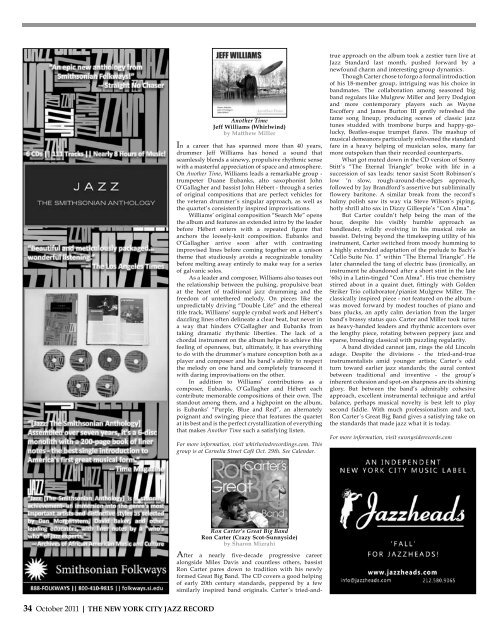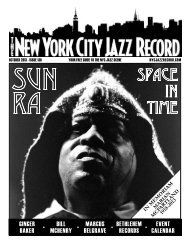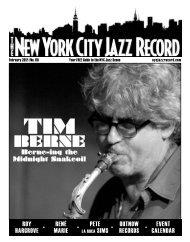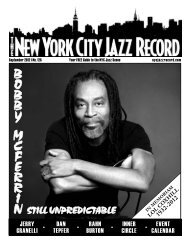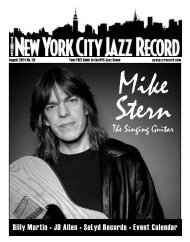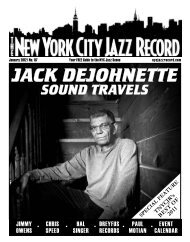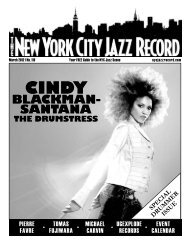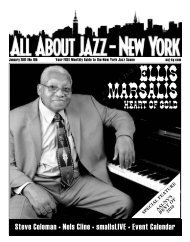Return of the Guitar Man - The New York City Jazz Record
Return of the Guitar Man - The New York City Jazz Record
Return of the Guitar Man - The New York City Jazz Record
You also want an ePaper? Increase the reach of your titles
YUMPU automatically turns print PDFs into web optimized ePapers that Google loves.
34 October 2011 | THE NEW YORK CITY JAZZ RECORD<br />
Ano<strong>the</strong>r Time<br />
Jeff Williams (Whirlwind)<br />
by Mat<strong>the</strong>w Miller<br />
In a career that has spanned more than 40 years,<br />
drummer Jeff Williams has honed a sound that<br />
seamlessly blends a sinewy, propulsive rhythmic sense<br />
with a masterful appreciation <strong>of</strong> space and atmosphere.<br />
On Ano<strong>the</strong>r Time, Williams leads a remarkable group -<br />
trumpeter Duane Eubanks, alto saxophonist John<br />
O’Gallagher and bassist John Hébert - through a series<br />
<strong>of</strong> original compositions that are perfect vehicles for<br />
<strong>the</strong> veteran drummer’s singular approach, as well as<br />
<strong>the</strong> quartet’s consistently inspired improvisations.<br />
Williams’ original composition “Search Me” opens<br />
<strong>the</strong> album and features an extended intro by <strong>the</strong> leader<br />
before Hébert enters with a repeated figure that<br />
anchors <strong>the</strong> loosely-knit composition. Eubanks and<br />
O’Gallagher arrive soon after with contrasting<br />
improvised lines before coming toge<strong>the</strong>r on a unison<br />
<strong>the</strong>me that studiously avoids a recognizable tonality<br />
before melting away entirely to make way for a series<br />
<strong>of</strong> galvanic solos.<br />
As a leader and composer, Williams also teases out<br />
<strong>the</strong> relationship between <strong>the</strong> pulsing, propulsive beat<br />
at <strong>the</strong> heart <strong>of</strong> traditional jazz drumming and <strong>the</strong><br />
freedom <strong>of</strong> unte<strong>the</strong>red melody. On pieces like <strong>the</strong><br />
unpredictably driving “Double Life” and <strong>the</strong> e<strong>the</strong>real<br />
title track, Williams’ supple cymbal work and Hébert’s<br />
dazzling lines <strong>of</strong>ten delineate a clear beat, but never in<br />
a way that hinders O’Gallagher and Eubanks from<br />
taking dramatic rhythmic liberties. <strong>The</strong> lack <strong>of</strong> a<br />
chordal instrument on <strong>the</strong> album helps to achieve this<br />
feeling <strong>of</strong> openness, but, ultimately, it has everything<br />
to do with <strong>the</strong> drummer’s mature conception both as a<br />
player and composer and his band’s ability to respect<br />
<strong>the</strong> melody on one hand and completely transcend it<br />
with daring improvisations on <strong>the</strong> o<strong>the</strong>r.<br />
In addition to Williams’ contributions as a<br />
composer, Eubanks, O’Gallagher and Hébert each<br />
contribute memorable compositions <strong>of</strong> <strong>the</strong>ir own. <strong>The</strong><br />
standout among <strong>the</strong>m, and a highpoint on <strong>the</strong> album,<br />
is Eubanks’ “Purple, Blue and Red”, an alternately<br />
poignant and swinging piece that features <strong>the</strong> quartet<br />
at its best and is <strong>the</strong> perfect crystallization <strong>of</strong> everything<br />
that makes Ano<strong>the</strong>r Time such a satisfying listen.<br />
For more information, visit whirlwindrecordings.com. This<br />
group is at Cornelia Street Café Oct. 29th. See Calendar.<br />
Ron Carter’s Great Big Band<br />
Ron Carter (Crazy Scot-Sunnyside)<br />
by Sharon Mizrahi<br />
After a nearly five-decade progressive career<br />
alongside Miles Davis and countless o<strong>the</strong>rs, bassist<br />
Ron Carter pares down to tradition with his newly<br />
formed Great Big Band. <strong>The</strong> CD covers a good helping<br />
<strong>of</strong> early 20th century standards, peppered by a few<br />
similarly inspired band originals. Carter’s tried-and-<br />
true approach on <strong>the</strong> album took a zestier turn live at<br />
<strong>Jazz</strong> Standard last month, pushed forward by a<br />
newfound charm and interesting group dynamics.<br />
Though Carter chose to forgo a formal introduction<br />
<strong>of</strong> his 18-member group, intriguing was his choice in<br />
bandmates. <strong>The</strong> collaboration among seasoned big<br />
band regulars like Mulgrew Miller and Jerry Dodgion<br />
and more contemporary players such as Wayne<br />
Esc<strong>of</strong>fery and James Burton III gently refreshed <strong>the</strong><br />
tame song lineup, producing scenes <strong>of</strong> classic jazz<br />
tunes studded with trombone burps and happy-golucky,<br />
Beatles-esque trumpet flares. <strong>The</strong> mashup <strong>of</strong><br />
musical demeanors particularly enlivened <strong>the</strong> standard<br />
fare in a heavy helping <strong>of</strong> musician solos, many far<br />
more outspoken than <strong>the</strong>ir recorded counterparts.<br />
What got muted down in <strong>the</strong> CD version <strong>of</strong> Sonny<br />
Stitt’s “<strong>The</strong> Eternal Triangle” broke with life in a<br />
succession <strong>of</strong> sax leads: tenor saxist Scott Robinson’s<br />
low ‘n slow, rough-around-<strong>the</strong>-edges approach,<br />
followed by Jay Brandford’s assertive but subliminally<br />
flowery baritone. A similar break from <strong>the</strong> record’s<br />
balmy polish saw its way via Steve Wilson’s piping,<br />
hotly shrill alto sax in Dizzy Gillespie’s “Con Alma”.<br />
But Carter couldn’t help being <strong>the</strong> man <strong>of</strong> <strong>the</strong><br />
hour, despite his visibly humble approach as<br />
bandleader, wildly evolving in his musical role as<br />
bassist. Delving beyond <strong>the</strong> timekeeping utility <strong>of</strong> his<br />
instrument, Carter switched from moody humming to<br />
a highly extended adaptation <strong>of</strong> <strong>the</strong> prelude to Bach’s<br />
“Cello Suite No. 1” within “<strong>The</strong> Eternal Triangle”. He<br />
later channeled <strong>the</strong> tang <strong>of</strong> electric bass (ironically, an<br />
instrument he abandoned after a short stint in <strong>the</strong> late<br />
‘60s) in a Latin-tinged “Con Alma”. His true chemistry<br />
stirred about in a quaint duet, fittingly with Golden<br />
Striker Trio collaborator/pianist Mulgrew Miller. <strong>The</strong><br />
classically inspired piece - not featured on <strong>the</strong> album -<br />
was moved forward by modest touches <strong>of</strong> piano and<br />
bass plucks, an aptly calm deviation from <strong>the</strong> larger<br />
band’s brassy status quo. Carter and Miller took turns<br />
as heavy-handed leaders and rhythmic accentors over<br />
<strong>the</strong> lengthy piece, rotating between peppery jazz and<br />
sparse, brooding classical with puzzling regularity.<br />
A band divided cannot jam, rings <strong>the</strong> old Lincoln<br />
adage. Despite <strong>the</strong> divisions - <strong>the</strong> tried-and-true<br />
instrumentalists amid younger artists; Carter’s odd<br />
turn toward earlier jazz standards; <strong>the</strong> aural contest<br />
between traditional and inventive - <strong>the</strong> group’s<br />
inherent cohesion and spot-on sharpness are its shining<br />
glory. But between <strong>the</strong> band’s admirably cohesive<br />
approach, excellent instrumental technique and artful<br />
balance, perhaps musical novelty is best left to play<br />
second fiddle. With much pr<strong>of</strong>essionalism and tact,<br />
Ron Carter’s Great Big Band gives a satisfying take on<br />
<strong>the</strong> standards that made jazz what it is today.<br />
For more information, visit sunnysiderecords.com


